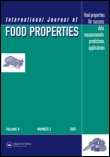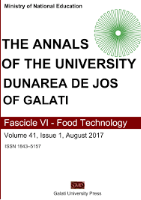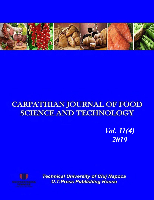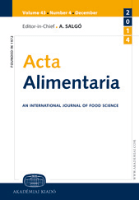
INTERNATIONAL JOURNAL OF FOOD PROPERTIES
Scope & Guideline
Transforming food science through open access research.
Introduction
Aims and Scopes
- Food Composition and Nutritional Analysis:
The journal publishes research on the nutritional composition of foods, including macronutrients, micronutrients, and bioactive compounds, highlighting their potential health benefits. - Food Processing Techniques:
Papers often describe innovative processing techniques such as high-pressure processing, microwave treatment, and fermentation, focusing on their effects on food quality, safety, and functional properties. - Functional Foods and Nutraceuticals:
Research on the development and evaluation of functional foods that offer health benefits beyond basic nutrition, including studies on bioactive compounds and their health effects. - Food Safety and Quality Control:
The journal includes studies that assess food safety, microbiological quality, and methods for detecting contaminants or adulterants in food products. - Phytochemical and Bioactive Compound Research:
A significant focus is on the analysis of phytochemicals from plants, their extraction, characterization, and potential health benefits, including antioxidant and antimicrobial properties. - Sensory and Consumer Studies:
Research that evaluates sensory properties of food products and consumer perceptions, preferences, and acceptance of various food innovations.
Trending and Emerging
- Plant-Based and Alternative Proteins:
There is a growing interest in plant-based proteins and their applications in food products, reflecting the increasing consumer demand for vegetarian and vegan options. - Functional Foods and Health Benefits:
Research focusing on the health benefits of functional foods and the role of specific bioactive compounds in disease prevention is on the rise, aligning with global health trends. - Sustainable and Innovative Food Processing:
Emerging studies highlight innovative and sustainable food processing methods, including the use of green technologies and waste valorization, which are gaining traction in food science. - Probiotics and Gut Health:
The investigation of probiotics, their health benefits, and their incorporation into various food products is increasingly prominent, reflecting growing consumer interest in gut health. - Artificial Intelligence in Food Science:
The integration of AI and machine learning techniques for food quality assessment and predictive modeling is an emerging theme, indicating a technological advancement in food science research.
Declining or Waning
- Traditional Food Preservation Techniques:
There has been a noticeable decrease in papers discussing traditional preservation methods, such as salting or smoking, as modern techniques take precedence in research. - General Food Chemistry:
Research focused solely on general food chemistry without specific applications or implications for health or processing is becoming less frequent, as the trend shifts towards more applied studies. - Food Packaging Technologies:
The exploration of conventional food packaging technologies is waning, with fewer studies on basic packaging materials and a shift towards innovative, sustainable packaging solutions.
Similar Journals

CZECH JOURNAL OF FOOD SCIENCES
Connecting Researchers to Revolutionize Food ScienceCzech Journal of Food Sciences is a premier publication in the field of food science, disseminating vital research since its inception in 1999 and transitioning to Open Access in 2007. Published by the Czech Academy Agricultural Sciences, this journal facilitates the exchange of knowledge among researchers, professionals, and students dedicated to advancing the understanding of food systems, safety, and technology. With an ISSN of 1212-1800 and an E-ISSN of 1805-9317, it holds a respectable position with a Q3 ranking in the Food Science category for 2023, illustrating its commitment to high-quality research despite its Scopus rank of 209 out of 389, situated in the 46th percentile. Located in the heart of the Czech Republic, at TESNOV 17, PRAGUE 117 05, this journal serves as an essential resource for those involved in agricultural and biological sciences, paving the way for innovative discoveries and applications in food science.

Food Hydrocolloids for Health
Pioneering Discoveries in Hydrocolloid ApplicationsFood Hydrocolloids for Health, published by ELSEVIER, stands at the forefront of research in the fields of food science, gastroenterology, nutrition, and pharmaceutical science. With an ISSN of 2667-0259 and an impressive positioning in the academic community, the journal is ranked Q1 in Food Science and Pharmaceutical Science, alongside Q2 rankings in Gastroenterology and Nutrition and Dietetics as of 2023. This journal serves as a critical platform for disseminating innovative findings related to the health benefits of food hydrocolloids, emphasizing their applications and efficacy in nutrition and medicine. Researchers, professionals, and students can access cutting-edge studies that promote the understanding of health outcomes derived from hydrocolloid-based foods. The journal’s international outreach from the Netherlands facilitates a diverse array of contributions, making it essential for those engaged in advancing knowledge within these dynamic disciplines.

Journal of Food and Nutrition Research
Fostering Interdisciplinary Approaches to Food ScienceJournal of Food and Nutrition Research, published by the VUP FOOD RESEARCH INST in Bratislava, Slovakia, serves as a vital platform for disseminating cutting-edge research in the fields of food science and nutrition. With an ISSN of 1336-8672 and an E-ISSN of 1338-4260, this journal emphasizes the importance of interdisciplinary approaches to address contemporary challenges related to food quality, dietary practices, and nutritional health. Notably recognized in the 2023 Scopus rankings, the journal is classified in Q3 quartiles for both Food Science and Nutrition & Dietetics, providing a forum for researchers aiming to enhance knowledge and practices within these domains. Those engaged in academia and industry will find the journal invaluable for its comprehensive scope, which covers novel food technologies, nutrition interventions, and the implications of dietary behaviors. Though not open access, the journal is dedicated to enriching the academic conversation and contributing to advancements in public health and nutrition policies.

International Food Research Journal
Exploring the Future of Food Technology and NutritionThe International Food Research Journal, published by UNIV PUTRA MALAYSIA PRESS, serves as a pivotal platform for disseminating innovative research within the field of food science. With an ISSN of 1985-4668 and an E-ISSN of 2231-7546, the journal has successfully established its presence since its inception in 2007, converging its findings through 2024. This esteemed journal holds a Q3 ranking in Food Science, illustrating its valuable contributions to the field as demonstrated by its Scopus rank of 276 out of 389, placing it in the 29th percentile among its peers in Agricultural and Biological Sciences. Although it operates under a traditional publishing model, its academic integrity and focus on high-quality research ensure that it remains a vital resource for researchers, professionals, and students eager to explore advances in food technology, nutrition, and safety. By encouraging interdisciplinary collaboration and critical dialogue, the International Food Research Journal plays an essential role in shaping the future of food science research.

Food Biophysics
Unveiling the Science Behind Food Quality and SafetyWelcome to Food Biophysics, an esteemed journal published by SPRINGER, dedicated to advancing the field of food science through the lens of biophysics. With an ISSN of 1557-1858 and an E-ISSN of 1557-1866, this journal provides a platform for the dissemination of innovative research from 2006 to 2024. Food Biophysics holds a distinguished position in the academic community, boasting a Q1 ranking in Food Science and Q2 rankings in Analytical Chemistry, Applied Microbiology and Biotechnology, Bioengineering, and Biophysics. This positions the journal in the 73rd percentile for Food Science, signifying its relevance and influence in the field. Although not Open Access, it remains an invaluable resource for researchers, professionals, and students interested in the intricate biophysical properties of food materials and processes. Explore cutting-edge findings that bridge disciplines and advance our understanding of how biophysics can innovate food preservation, safety, and quality.

Annals of the University Dunarea de Jos of Galati, Fascicle VI-Food Technology
Navigating the Evolving Landscape of Food TechnologyAnnals of the University Dunarea de Jos of Galati, Fascicle VI-Food Technology is a distinguished academic journal published by GALATI UNIV PRESS, dedicated to advancing knowledge in the field of food technology. With an open access format since 2007, this journal enhances accessibility to research findings and facilitates the dissemination of innovative ideas among researchers, professionals, and students worldwide. The journal holds a noteworthy position in its category, boasting a 2023 Q3 ranking in both Food Science and Industrial and Manufacturing Engineering, indicating its relevance and contribution to these critical fields. As it converges years of publication from 2012 to 2023, it encapsulates an evolving body of knowledge that reflects the latest advancements and research trends. Although it may not yet have a defined HIndex, its presence in Scopus with ranks of #253 in Industrial and Manufacturing Engineering and #278 in Food Science underscores its emerging impact. This journal is particularly significant for those engaged in research related to food technology and engineering, facilitating dialogue and collaboration within the community while addressing pressing challenges and innovations in food processing and safety. With its commitment to quality research, Annals of the University Dunarea de Jos of Galati serves as an essential resource for fostering knowledge and promoting scientific discussion.

Carpathian Journal of Food Science and Technology
Transforming Ideas into Innovations in Food ScienceCarpathian Journal of Food Science and Technology, a distinguished publication from the NORTH UNIV CENTER BAIA MARE, has been a pivotal platform for disseminating groundbreaking research in the field of food science since its inception in 2009. With an ISSN of 2066-6845 and an E-ISSN of 2344-5459, this Open Access journal aims to promote knowledge and innovation, offering unrestricted access to its content, thereby enhancing visibility for authors and facilitating a wider readership. Based in Romania, the journal plays a crucial role in advancing scientific inquiry within the agricultural and biological sciences, particularly focusing on contemporary food science issues. As it continues its convergence through 2024, the journal currently holds a Q4 ranking in the Food Science category, allowing it to carve out a unique niche within the academic community despite its current Scopus percentile ranking of 19th. Scholars, researchers, and students in the field will find the journal an invaluable resource for the latest advancements and discussions, making it an essential addition to their academic pursuits.

Journal of Food Science and Technology-Ukraine
Connecting Global Minds in Food Technology ResearchJournal of Food Science and Technology-Ukraine, published by the Odesa National University of Technology, stands as a pivotal platform dedicated to the dissemination of high-quality research in the field of food science and technology. With its open access policy established in 2014, the journal fosters global knowledge sharing and accessibility, enabling researchers, professionals, and students to access critical findings and advancements in food technology without barriers. The journal's commitment to publishing innovative studies, reviews, and case analyses reinforces its role in addressing contemporary challenges in food safety, preservation, processing, and nutritional quality. With ISSN 2073-8684 and E-ISSN 2409-7004, it serves as a valuable resource for the academic community, supporting the advancement of food science knowledge and its practical applications.

ACTA ALIMENTARIA
Connecting research and practice in food technology.ACTA ALIMENTARIA is a renowned journal in the field of food science, published by AKADEMIAI KIADO ZRT, based in Hungary. Since its inception in 1973, it has served as a vital platform for disseminating high-quality research on food chemistry, microbiology, nutrition, and technology, contributing significantly to the advancement of knowledge in the agricultural and biological sciences. Currently classified in the Q3 quartile of the 2023 Food Science category, the journal is positioned to address pressing issues pertaining to food safety, quality, and sustainability, making it an invaluable resource for researchers, professionals, and students alike. Although it does not currently offer open access, the journal maintains a strong reputation with a readership keenly interested in the latest developments in food science. With a Scopus rank placing it in the 38th percentile of its category, ACTA ALIMENTARIA continues to be a pivotal reference for those engaged in food research and innovation.

Food Production Processing and Nutrition
Innovating food processing for a healthier tomorrow.Food Production Processing and Nutrition, published by SpringerNature, stands at the forefront of advancing knowledge in the vibrant fields of food science, nutrition, and public health. This esteemed Open Access journal, operational since 2019, plays a pivotal role in disseminating breakthrough research that intersects food production processes with nutritional insights, making it an invaluable resource for researchers, professionals, and students alike. With a commendable 2023 impact factor reflecting its robust scholarly contributions — Q1 in Food Science and Q2 in both Nutrition and Dietetics and Public Health, Environmental and Occupational Health — the journal not only emphasizes the importance of innovative food processing methods but also addresses pressing nutritional challenges faced globally. Located in the United Kingdom, it claims an impressive Scopus ranking, with a notable percentile standing across various categorical metrics. As such, Food Production Processing and Nutrition is essential for anyone aiming to deepen their understanding of how food systems impact public health through effective processing and nutritional strategies.